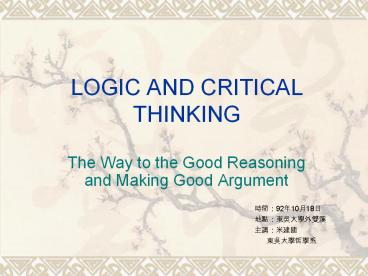LOGIC AND CRITICAL THINKING - PowerPoint PPT Presentation
1 / 19
Title: LOGIC AND CRITICAL THINKING
1
LOGIC AND CRITICAL THINKING
- The Way to the Good Reasoning and Making Good
Argument
??92?10?18? ????????? ????? ???????
2
What Is Critical Thinking?
- Think it twice Dont take things for granted so
easily. - Always ask the why-question Try to find out the
reason (the premises) why certain claim (the
conclusion) can be supported. - Examine and evaluate the relationship between the
reasons and the claim.
3
Paradoxes
- Self-defeating paradox The concept of all
powerful God - Zenos paradox An apparently unacceptable
conclusion derived by apparently acceptable
reasoning from apparently acceptable premises - Semantic paradox The liars paradox
- The lawyers paradox
- Prisoners dilemma
- Russells paradox (Barbers paradox)
- The lottery paradox
4
What is logic?
- Logic is not an empirical science
- Formal or informal science
- Logic v.s.Psychology
- 1. The Laws of Thinking
- 2. The Science of Reasoning
- 3. The Science of Argument
- The study of the methods and principles used to
distinguish good (correct) from bad (incorrect)
reasoning or argument. - The way to the good reasoning (making good
argument) and critical thinking
5
What Is an Argument?
- An argument is the fundamental structure of the
reasoning. - An argument consists of premises and conclusion.
- An argument is used to provide reasons for
supporting some claim or proposal. - Logic aims to the study of the various forms of
argument. - The ultimate goal of logic is to evaluate
arguments.
6
The Standard Form of Argument
- P premise, C conclusion
- There must be some kind of supporting
relationship between premises and conclusion. - P1
- P2
- ?
- ?
- Pn (n?1)
- C
7
Two Kinds of Argument
- The traditional but mistaken distinction between
deduction and induction - Deduction
Induction - Some general principles Some particular
cases - ? ?
- A particular case A general principle
8
Deductive Argument
- Deductive argument is the argument that the
premises necessarily support the conclusion. - P1
- P2
- ?
- ?
- Pn
- C
9
Inductive Argument
- Inductive argument is the argument that the
premises probably support the conclusion. - P1
- P2
- ?
- ?
- Pn
- C
10
Evaluating An Argument
- There are two ways of evaluating an argument.
- Formal logic is to use the deductive criterion
for evaluating arguments. - Informal logic is to use the inductive criterion
for evaluating argument.
11
The Criterion for Evaluating a Deductive Argument
- Deductive Argument
- Valid Arg. Invalid Arg.
- Sound Arg. Unsound Arg. Unsound Arg.
- Good Arg. Bad Arg Bad Arg.
12
The Criterion for Evaluating an Inductive Argument
- Inductive Argument
- Strong Arg. Weak Arg.
- Cogent Arg. Uncogent Arg.
Uncogent Arg. -
- Good Arg. Bad Arg. Bad Arg.
13
What Is a Good Argument
14
The Deductive Systems
- The truth table methods for evaluating deductive
arguments - The formal system of natural deduction
- 1. Propositional logic
- 2. Predicate logic
- The Aristotelian logic (Categorical Syllogism)
- The axiomatic system
15
The Inductive Systems
- The methods of analogy and the probable inference
- Legal reasoning
- Mills method and causality
- Statistical reasoning and probability
- Hypothetical reasoning
16
Informal Fallacies
- A fallacy is an error in reasoning.
- Fallacies of relevance When an argument relies
upon premises that are not relevant to its
conclusion, and therefore cannot possibly
establish its truth - Fallacies of weak induction When the connection
between premises and conclusion is not strong
enough to support the reasoning - Fallacies of presumption, ambiguity, and
grammatical analogy
17
The Uses of Logic
- Evaluate someone elses argument by exposing its
structure - Set up your own argument
- Solve problems and puzzles by answering the
why-questions (giving the reasons) - Inference to the best through using the present
evidences - Thinking effectively and making decision wisely
18
Logic and Critical Thinking
- Why should we become a critical thinker?
- Be the master of your own life
- To ask why? is to ask for the reasons for some
beliefs and opinions (that is, to find out the
premises for a certain conclusion) - To evaluate how the reasons successfully support
the claim (that is, to evaluate how the premises
support the conclusion ) - A critical thinker is a truth-pursuer, and logic
is truth-preserving.
19
The End!

